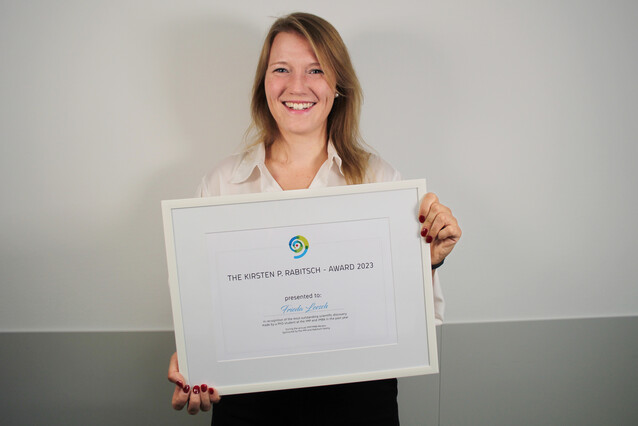Rabitsch Award 2023 for Frieda Leesch
The Kirsten Peter Rabitsch Award, established in 2006, celebrates the accomplishments of a PhD student at the IMP or at IMBA each autumn. This year, Frieda Leesch, a recent PhD graduate from Andrea Pauli's lab who successfully defended her thesis in August, is the recipient of the award. Her remarkable contributions to the fields of ribosome biology and translational regulation have earned her this recognition.
Frieda Leesch joined the Vienna BioCenter PhD Program in 2017, working under the supervision of Andrea Pauli. Her research venture introduced a new dimension to the Pauli lab’s work: the study of protein translation regulation. Through her work, Leesch uncovered previously unknown aspects of ribosome biology – important discoveries that earned her the Rabitsch Award 2023. The award ceremony took place in the presence of Hermann Rabitsch, the father of Kirsten Rabitsch, after whom the award is named.
An unexpected discovery
While studying differences in ribosome protein composition and structure between early and late embryonic ribosomes, Leesch, who had teamed up with Laura Lorenzo-Orts, a postdoc from the Pauli lab, and cryo-electron microscopy experts from the Haselbach lab, made an unexpected discovery. “We used cryo-electron microscopy on zebrafish egg ribosomes and looked closely at 3D reconstructions. I noticed that something was stuck in the ribosome’s exit tunnel. That’s where newly formed proteins normally emerge. At first, I thought a protein was being synthesised, but I wouldn’t believe it – translation isn’t supposed to be very active in eggs,” Leesch says. “It then turned out that this mysterious structure was in fact a previously unknown molecular ‘plug’ that represses the ribosome.”
After extensive research, Leesch and colleagues identified this ‘plug’ as the small protein Dap1b, which had never been associated with the ribosome before. Dap1b, in conjunction with three other proteins, prevents ribosomes from initiating translation until the optimal moment arrives. This groundbreaking discovery, published in the journal Nature in January, was the fruit of an interdisciplinary effort that merged developmental biology, genetics, structural biology, and biochemistry – fostering collaboration among researchers from across the IMP.
Collaboration was also key for finalising Leesch’s initial PhD project, for which she teamed up with a fellow PhD student at MIT to characterise potential differences between maternal and somatic ribosomes in zebrafish. Their research presents a foundation for future explorations into possible regulatory mechanisms and functional roles of heterogeneous ribosomes.
“All the projects I worked on involved collaborations with other labs, at the IMP and beyond. The level of collaboration and access to cutting-edge technologies on campus is truly empowering,” Leesch says. “I’m very grateful for receiving the Rabitsch Award, which recognises years of research.”
In coming years, Frieda Leesch will continue her academic journey with a postdoc position to explore new lines of research, either in translation mechanisms, or in technology development.
About the Vienna BioCenter PhD Program
Frieda Leesch was a doctoral student of the Vienna BioCenter PhD Program. Are you interested in a world-class career in molecular biology? Find out more and apply in the current call until 15 October: https://training.vbc.ac.at/phd-program/
About the Rabitsch Award
The Rabitsch Award is named after Kirsten Peter Rabitsch, a former PhD Student in Kim Nasmyth’s lab at the IMP. He was a promising scientist and had just completed his doctorate when he died tragically in Bolivia in 2006.
The prize of 2,000 Euro is sponsored jointly by the IMP and Kirsten’s parents Hermann Rabitsch and Joana Krizanits. It is awarded each year during the IMP/IMBA Recess and goes to an exceptional PhD Student from one of the two institutes.
List of Rabitsch Award laureates
Further reading
